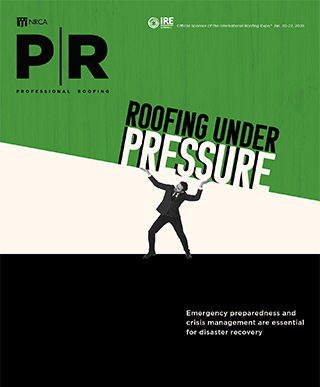Florida bill would allow minors to work on roofing jobs

|
Florida State Senate Bill 460, introduced in November 2023 by Republican state Sen. Corey Simon, would provide exemptions allowing minors as young as 16 to work on roofing jobs and revise requirements to expand career fairs, according to Construction Dive.
The bill would allow minors with Occupational Safety and Health Administration 10-hour certifications to perform commercial and residential roofing work when supervised by a worker who is 21 or older and has two years of experience and an OSHA 10 certification.
The bill also would require annual career fairs at high schools to provide students in grades 11 and 12 the opportunity to meet with employers from industries such as agriculture, construction and nursing to learn about career and technical education.
Critics of the bill say it is a temporary fix to keep job sites staffed. Undocumented workers reportedly have left job sites to work elsewhere since Florida began using the E-Verify System, which allows employers to confirm the eligibility of their employees to work in the U.S.
Under the federal Fair Labor Standards Act, workers younger than 16 only can perform office or sales work in the construction industry. Workers aged 16 and 17 can work on construction job sites, but federal law prohibits them from performing hazardous tasks, such as roofing.
Another bill in the Florida House of Representatives could remove some restrictions regarding the hours minors can work, allowing them to work at later times of day. Both bills have been sent to committees for review before voting from the state legislature.
Utah contractor faces $2.8 million in lawsuits

|
Makers Line, the construction arm of Q Factor, a Salt Lake City-based development firm, faces at least 15 lawsuits alleging the contractor failed to pay its subcontractors on several different construction projects in Utah, totaling about $2.8 million in damages, according to Construction Dive.
Many of the lawsuits include construction lien claims on associated properties, according to court documents. For example, H&E Equipment Services, Baton Rouge, La., filed liens against several properties where Makers Line is involved. The company claims it never received full payment for the rental equipment provided during construction. Similarly, in another lawsuit, LG Concrete, Ogden, Utah, claims Titus, a concrete firm and sister company of Makers Line, failed to pay in full for the construction labor, materials and equipment LG Concrete provided for the project.
Several more lawsuits filed in Utah contain similar allegations. Makers Line has at least eight ongoing projects in Salt Lake City, according to city records.
Makers Line has claimed it cannot pay its subcontractors until it gets paid by project owners, according to the Salt Lake Tribune. Only seven states have laws that explicitly make pay-if-paid clauses unenforceable by statute: California, Delaware, New York, North Carolina, South Carolina, Wisconsin and Virginia, according to a survey by law firm Woods Aitken, Omaha, Neb.
However, the survey says nine other states, including Utah, have language on the books or legal precedent that make pay-if-paid clauses unenforceable under certain conditions. For more information about pay-if-paid clauses, including contract provisions, visit nrca.net/legal.
Roofing company faces $522,527 in penalties after fatal fall

|
An Occupational Safety and Health Administration workplace safety investigation found Elite Roofing Services Inc., Huntington, N.Y., could have prevented a roofing worker’s fatal fall in April 2023 at a Glen Cove, N.Y., job site by following legally required safeguards designed to prevent falls, according to OSHA. Elite Roofing Services is not an NRCA member.
OSHA determined the deceased worker and other Elite Roofing Services employees were installing metal decking on a low-slope industrial roof when the worker fell through an opening to a concrete floor nearly 20 feet below.
OSHA investigators learned Elite Roofing Services did not provide roofing workers with protection against fall hazards such as guardrails, safety nets, personal fall-arrest systems, positioning devices or fall-restraint systems. The work being completed fell under OSHA’s steel erection standard; Elite Roofing Services failed to train each employee regarding how to recognize and mitigate fall hazards before conducting the steel erection work.
OSHA issued six willful violations for the fall hazards (one violation for each exposed worker) and one serious violation for not training the workers, totaling $522,527 in penalties.
NRCA’s classes, webinars and products offer information to ensure you can keep your employees safe on job sites. Visit NRCA’s bookstore at nrca.net/product for more information.



